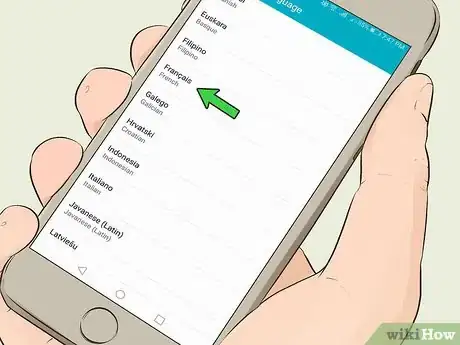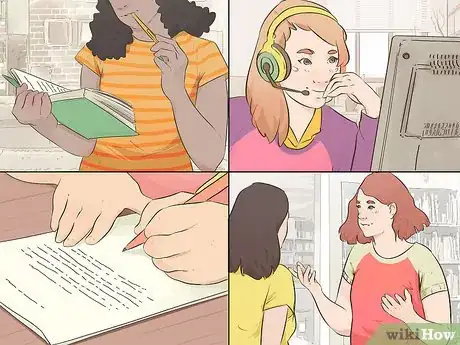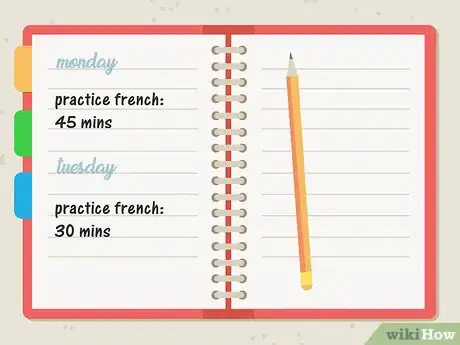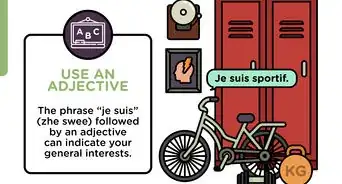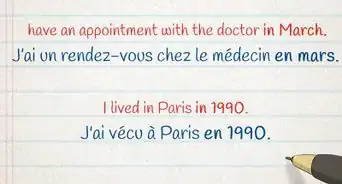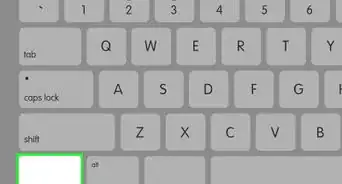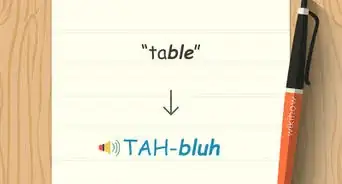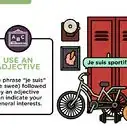This article was co-authored by Lorenzo Garriga and by wikiHow staff writer, Christopher M. Osborne, PhD. Lorenzo is a native French speaker and French language connoisseur. He has many years of experience as a translator, writer and reviewer. He is also a composer, pianist, and globe-trotter, who has been travelling the world on a shoestring for almost 30 years with a backpack.
This article has been viewed 13,011 times.
It’s great if you want to quickly learn some basic French so you can pass a language requirement or order food at a Parisian cafe during your vacation. True fluency in French, however, generally means that you have the confidence to speak, write, read, and comprehend the language under normal circumstances. Once you’ve determined what fluency means for you and what your French language goals are, seek out everyday opportunities to expose yourself to written and spoken French. Additionally, take French language classes and immerse yourself in environments with native French speakers.
Steps
Building Your French Skills Every Day
-
1Use French flashcards for 5-10 minute sessions throughout the day. All you need is a stack of cards with common words in your native language on one side and the French equivalent on the other side. You can buy sets of cards, print online flashcards, or simply make them yourself.[1]
- When you have a few free minutes throughout the day, pull out your flashcards and go through some of the stack. Alternate which sides of the cards you start with—French or your native language—each time.
- Continually add to your flashcard stack with new words, and pull out words that you’ve mastered. (But keep these pulled cards handy for occasional review sessions.)
-
2Make French music your background music, and sing along. When you’re tidying up around your home, put on a French music playlist. Fuel your evening jog by having French pop music coming through your earbuds. Become an expert on the song catalogs of Edith Piaf and Johnny Hallyday![2]
- Thanks to the ubiquity of music streaming services, it’s easier than ever to get access to an endless supply of French-language music.
- Singing along in the shower is a great way to build your vocabulary and pronunciation skills!
Advertisement -
3Watch French TV or online videos for 30+ minutes daily. If you have cable TV, you might find a French-language news or entertainment channel tucked away deep in the recesses of your lineup. If not, head online to find shows, movies, and short videos in French.[3]
- You can start out with the subtitles on, but turn them off after you start to get more comfortable with the language.
- U.S. cable TV systems sometimes carry, for example, France24, which covers global news, and/or TV5Monde, which carries a range of French language shows. You can also access videos and some shows from these stations online.
-
4Listen to French podcasts or audiobooks during your commute. This is a great way to get more exposure to hearing French during your day-to-day routine. At first, you’ll struggle to figure out what’s being said, but you may be surprised by how quickly you start to pick up on words, phrases, and even entire conversations.[4]
- The more intently you can listen, the better. So, you may get faster results if you ride the bus rather than drive for your commute. But you can also listen while doing the dishes or gardening!
-
5Read French websites, newspapers, magazines, or books daily. Just as you want to have daily exposure to listening to French, try to make sure you read some French every day. Aim for at least 15-30 minutes of looking over French-language publications, whether in print or online.[5]
- Keep a French-English (or your native language) dictionary handy, especially at first. However, always try to use context clues first to figure out the meaning of a word or phrase.
-
6Take notes and recap what you’ve heard, seen, or read. Keep a pen and notepad ready, or use your smartphone. As you’re listening, watching, or reading, jot down a few notes to yourself in French. Then, when you’re done, do your best to briefly summarize the material in French.[6]
- Your notes and recaps may start out very basic: “L’homme était fâché que son équipe ait perdu.” (“The man was angry that his team lost.”) But you’ll be able to write in more detail over time.
- People sometimes overlook competency in written expression when learning a language, but this is generally considered to be an important aspect of fluency.
-
7Change your phone and other electronics over to French. This is a great way to challenge yourself after you begin to get more comfortable with the language. Just make sure you know how to switch the device back to your native language if you get stuck![7]
-
8Switch up your source materials every 2-3 weeks. In other words, switch to a new TV show, new musical style, new podcast genre, new online newspaper, and so on. This way, you’ll get a broader exposure to the ways in which the French language is used in different contexts.[8]
- Switching things up regularly also helps to ward off boredom. After you’ve gotten used to Le Monde’s take on the news, see what Le Figaro has to offer.
Interacting with Other French Speakers
-
1Take French language classes in your local area. This is the obvious solution to getting better at French, but it’s also still one of the best solutions! If you have a community college nearby, there’s a good chance they offer French courses. Otherwise, your odds may be better if there is at least a small French-speaking community in your area.[9]
- Online classes are a decent alternative if you can’t find in-person classes nearby. However, many learners benefit from interacting in person with their instructors and fellow students.
-
2Use a webcam for remote tutoring or just conversation. If you can find an affordable French tutor in your area for some one-on-one instruction, go for it. Otherwise, search online for tutors who use programs like Skype to remotely work “face-to-face” with their clients.[10]
- If you know any fluent French speakers who live in the neighboring town or halfway around the world, use Skype or another option to have French-language conversations with them once or a few times per week.
- Mixing group-based instruction (like a French class), one-on-one exposure (like tutoring), and self-guided work (like flashcards and watching French TV) offers a well-rounded path to fluency for many learners.
-
3Interact as much as possible with French speakers you know. In addition to making occasional Skype calls with your second cousin who lives in Montreal, seek out every available opportunity to interact with native and/or fluent French speakers. The more often you surround yourself with—and take part in—French conversations, the faster you’ll pick up on the subtleties of the language.[11]
- If you’re in college, for instance, you might set up a French club with a few friends who are also trying to master the language. You could meet up weekly at a local cafe and converse only in French.
-
4Travel to a French-speaking area and immerse yourself in the language. Looking for a great excuse to take that trip to Paris you’ve always wanted? Go for it! Just make sure to put yourself in situations where you get to use your French language skills as much as possible.[12]
- When you’re trying to practice your French with a native speaker, you may find that they want to speak your language instead so they can practice (especially if you’re a native English speaker). Set a schedule so you can spend a roughly equal amount of time speaking your language and French.
- France isn’t your only option here, of course. If you’re in the U.S., for instance, you could head up to Quebec in Canada. You can also find countries with large numbers of French speakers in parts of Africa, Southeast Asia, and the Caribbean, among other places.
Setting Clear Goals
-
1Tailor your efforts to suit your specific French language goals. Do you want to become fluent in French so you can communicate easily with a Francophone friend or relative? So you can read classics of French literature in untranslated form? Because you want to move to the French Riviera? Being clear on your goals for fluency will make it easier to fine-tune your learning process.[13]
- For instance, if reading fluency is your primary goal, you can focus more of your efforts there. Or, if you work with a group of French-speaking scientists, you can tailor your training to emphasize the vocabulary used in your field.
-
2Figure out exactly what “fluency” means to you. This relates to establishing your particular goals for your French language skills, but it’s also about the degree of “mastery” over the language you hope to achieve. “Fluency” doesn’t mean you know everything about the language—otherwise, even native speakers wouldn’t be fluent!
- You might consider yourself fluent, for instance, if you can use the language to learn more of the language, and if don’t need to rely on your native language to express yourself in French under typical circumstances.[14]
- Or, in more simple terms, you might define fluency as confidence—that is, to mean that you are confident that you can comprehend and express yourself in French whenever needed.[15]
- If you need to demonstrate fluency for a particular job, as part of your education, or for immigration or citizenship purposes, make sure you clearly understand the criteria for fluency.
-
3Emphasize both expression and comprehension skills. Even though fluency can mean different things to different people, you should expect it to mean that you are competent and confident with your French skills in the following four general areas:[16]
- Oral expression: for example, joining in a conversation seamlessly.
- Listening comprehension: for instance, comfortably following along while listening to a lecture.
- Written expression: for example, sending long emails back and forth with a friend.
- Reading comprehension: for instance, reading a French newspaper each morning without having to regularly look up words.
-
4Create a schedule and intermediate goals on your way to fluency. There’s no way around it—French fluency takes work. Aim to set aside at least 30-60 minutes each day that you can dedicate specifically to working on your French skills. Based on the pace you’re working at, set goals for yourself along the way as well—this will help to keep you motivated.[17]
- For example, you might set a goal to confidently order dinner for two at a posh French restaurant by the end of next month, or to watch a full French newscast without subtitles by mid-summer.
- Reward yourself when you achieve an intermediate goal. Find a French bakery and indulge yourself!
Expert Q&A
Did you know you can get expert answers for this article?
Unlock expert answers by supporting wikiHow
-
QuestionHow can I learn oral French fast?
 Lorenzo GarrigaLorenzo is a native French speaker and French language connoisseur. He has many years of experience as a translator, writer and reviewer. He is also a composer, pianist, and globe-trotter, who has been travelling the world on a shoestring for almost 30 years with a backpack.
Lorenzo GarrigaLorenzo is a native French speaker and French language connoisseur. He has many years of experience as a translator, writer and reviewer. He is also a composer, pianist, and globe-trotter, who has been travelling the world on a shoestring for almost 30 years with a backpack.
French Translator & Native Speaker To become proficient on the piano, you play eight hours a day. French is no different. You have to talk, talk, talk. You can memorize words, but if you don’t say them, they will never become natural. You might be afraid to talk at the beginning in fear of saying the wrong word or being mocked, but it’s much better to speak freely, and people will correct you the more you speak.
To become proficient on the piano, you play eight hours a day. French is no different. You have to talk, talk, talk. You can memorize words, but if you don’t say them, they will never become natural. You might be afraid to talk at the beginning in fear of saying the wrong word or being mocked, but it’s much better to speak freely, and people will correct you the more you speak.
References
- ↑ https://www.fluentu.com/blog/french/how-to-become-fluent-in-french/
- ↑ http://joyoflanguages.com/how-im-becoming-fluent-in-french/
- ↑ https://frenchcrazy.com/2012/09/fluent-in-french-fast.html/
- ↑ http://joyoflanguages.com/how-im-becoming-fluent-in-french/
- ↑ http://joyoflanguages.com/how-im-becoming-fluent-in-french/
- ↑ http://joyoflanguages.com/how-im-becoming-fluent-in-french/
- ↑ https://frenchcrazy.com/2012/09/fluent-in-french-fast.html/
- ↑ https://www.fluentu.com/blog/french/how-to-become-fluent-in-french/
- ↑ https://frenchcrazy.com/2012/09/fluent-in-french-fast.html/
- ↑ http://joyoflanguages.com/how-im-becoming-fluent-in-french/
- ↑ https://frenchcrazy.com/2012/09/fluent-in-french-fast.html/
- ↑ https://www.fluentu.com/blog/french/how-to-become-fluent-in-french/
- ↑ https://frenchcrazy.com/2012/09/fluent-in-french-fast.html/
- ↑ https://www.mezzoguild.com/being-fluent-in-your-target-language/
- ↑ https://www.clozemaster.com/blog/what-is-fluency/
- ↑ https://www.fluentu.com/blog/french/how-to-become-fluent-in-french/
- ↑ https://frenchcrazy.com/2012/09/fluent-in-french-fast.html/






